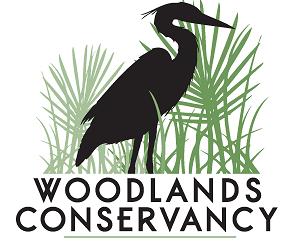Woodlands Conservancy is a 501-C-3, nonprofit land trust organization created with the mission to preserve and restore forested wetlands and other ecologically or historically significant lands in Louisiana. The vision of Woodlands Conservancy is to be the regional model for the conservation of hardwood forests, and a leader in the advocacy and preservation of Louisiana’s coastal forest ecosystems.
Conservation and Wildlife
Hundreds of millions of birds cross the gulf each year and travel along the Mississippi Flyway with 2.5 million stopping daily in Louisiana to feed and rest. Woodlands Conservancy’s managed properties provide habitat for several species of Conservation Concern per Louisiana’s comprehensive wildlife conservation strategy, the Wildlife Action Plan, and several species of Continental Importance according to Partners in Flight. With the continuing loss of our wetlands in combination with relative sea level rise, the Woodlands Conservancy lands are expected to be one of the largest forested land masses between open water and the city of New Orleans within the next 35-50 years. The value of this habitat for migratory birds makes it imperative that we preserve, restore and enhance the habitat within our few remaining coastal forests and educate our children of their value in order to foster their development as environmental stewards of the lands their children will inherit.
A land trust functions by protecting and conserving ecologically significant natural areas, streams, landmarks and cultural resources for current and future generations. Land trusts work with community partners to create healthy and sustainable natural environments through land donations, conservation easements, or purchases.
Woodlands Conservancy manages and owns property with the goal of restoring and maintaining healthy forested wetlands and landscapes that provide the habitat for wildlife and migratory birds, protect our community by providing a critical storm buffer and providing our community with beautiful natural spaces that make Louisiana the Sportsman’s Paradise.
Land Donation and Conservation Servitudes
Land can be protected through fee ownership or through a conservation servitude. You may also be able to donate or sell development rights, or do a bargain sale.
Factors Favorable to Fee Ownership:
- Property contains very sensitive natural resources
- Public use is a significant conservation objective
- Resources on the property require intensive management
- Surrounding lands are owned in fee by the land trust or other conservation organization or agency
Factors Favorable to Conservation Servitudes:
- Conservation objectives include productive use
- Private ownership is compatible with the conservation objectives
- The land trust has the capability and finances to monitor and enforce the servitude
- Restrictions that protect the resource
One of the most traditional tools for conserving private land is a Conservation Servitude. An easement/servitude is a legal agreement between the landowner and the land trust that limits the uses of the land in order to protect its conservation values. For example, land identified as being a critical wildlife corridor between areas of development might prohibit any development while an easement on a working farm might allow the addition of agricultural structures. A servitude may apply to all or a portion of the property, and need not require public access. The land trust is responsible for ensuring that the terms of the servitude are followed in perpetuity.
A Conservation Servitude allows a landowner to continue to own and use their land, and they can also sell it or pass it on to heirs.
A landowner sometimes sells a conservation servitude, but usually servitudes are donated to a land trust. If the donation benefits the public by permanently protecting important conservation resources, and meets other federal tax code requirements, it can qualify as a tax-deductible charitable donation.
Perhaps the most important benefit, a conservation servitude can be essential for passing undeveloped land on to the next generation. By removing the land’s development potential, the servitude typically lowers the property’s market value, which in turn lowers potential estate tax. Whether the servitude is donated during life or by will, it can make a critical difference in one’s heirs’ ability to keep the land intact. (Land Trust Alliance)

 WOODLANDS CONSERVANCY
WOODLANDS CONSERVANCY

